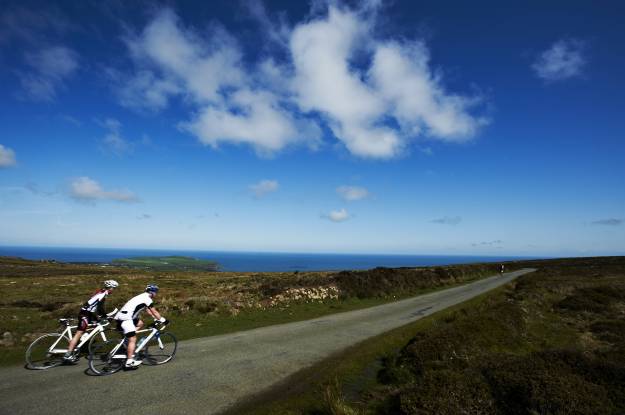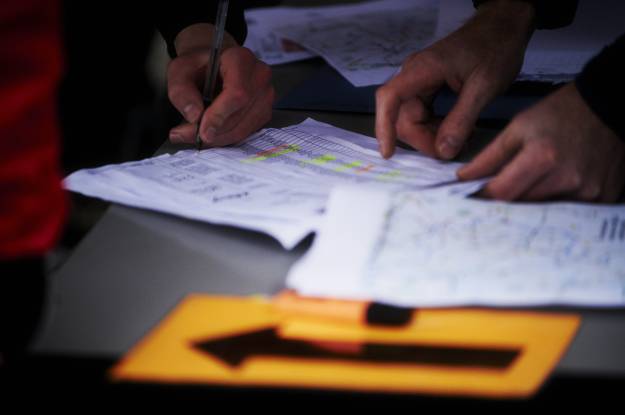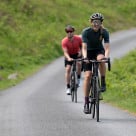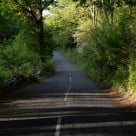Frequently Asked Questions - from consultation phase
Will SC be producing advertisment/development literature/posters to help centres/clubs?
Re-focussed Centres which are clearly part of Scottish Cycling rather than independently constituted bodies would allow us to direct advertising/marketing/branding towards these entities.
What is SC doing to encourage "private members" to join Clubs?
The introduction of the "club management tool" allows clubs to adminsiter all of their members and activities through this tool, helps raise the profile of the club and allows targetted messages to all prosepctive members. Other SC literature and communications indicates that "value added services", such as coaching, social activities, club activities, events are best accessed as part of a club.
Limited liability is not mentioned in the Terms of Reference where does these leave the new Centres/Regional Development Groups?
As an "integral" part of Scottish Cycling it is inetended that the Regional Development Groups would be covered under company policies, but this area would be investigated further. Currently all Centres are constituted as "unincorporated bodies" where the liability would lie with the Committee members.
Should charitable status be considered?
This has currently not been considered but SC will seek advice and views from sportscotland and other governing bodies.
If competition for resources between Centres/Development Groups was introduced this could be devisive?
The intention is to allocate resource against levels of activity within the Centre/Region for levies, members of clubs and number of clubs in line with current practice. The new groups would all have a plan which identified resource needs and new avenues of funding explored to deliver against the plan.
The proposed regions are split on current club allocations, are there any projected club numbers. i.e. offroad clubs may grow many times more in certain areas compared to potentially stagnant road club numbers in those areas. May the proposed regions have to change again if the sport progresses as intended?
The proposed regions will be based on geographic boundaries (as is the current system), which may be subject to tidying up. It is unlikely that the boundaries would need to change in the near future and that the growth of the support in the region would reflect the demography, facilities and potential for growth of that region.
A common concern with UK clubs is that British Cycling are not seen to help road racing develop at grass roots level enough. What can Scottish Cycling do to improve grass roots road cycling in the regions?
It is intended that each region would have a plan to reflect the needs of the cycle-sport disciplines in that region. So grass roots road cycling is likely to be a key feature in the plans of all regions. Clubs would have input to developing the plans and able to shape them to suit local needs.
My proposed region will run from the East side of Loch Lomond, through Stirling, squeezed through a narrow band & into Edinburgh & the Borders. How is it intended that people will meet & transfer information over such a wide area, it will be impossible for everybody to meet up all at once? Virtual meetings?
It is intended that each region would hold quarterly forum meetings with all clubs to report progress against the plan and to obtain feedback from the clubs. It is also anticipated that if the larger regional boundaries are accepted that there would be "sattelite" areas of activity that dealt with more localised activities. In the region you outline there are obvious centres of activity in Stirlingshire, Edinburgh& Lothians and Scottish Borders, some of which already have local forums.
What happens to the money in 'Centre' coffers?
That would be a matter for Centre Officials of each of those un-incorporated bodies. It is hoped that it would be allocated against future developments of the sport in those geographic areas. Future monies would be allocated to the proposed Regional Development Group for spend against plan in that region.
Are race levies still going to exist & paid into regions instead of centres. Can we also clarify if levies are paid depending on where the events are held, i.e. are all events at Glasgow velodrome paid into the region that includes that facility, are all levies for events run in Stirligshire from clubs outside that are paid into that region. May seem petty, but questions keep getting asked, it's complicated to know who to pay sometimes.
Race levies will continue to exist and it is proposed that these be paid to a central point, at which point a calculation will be made and any rebate allocated to the region in which the activity took place. As we move forward it is possible that our online systems would handle most of this administration. Further discussion is required on the issues you raise and in relation to the different disciplines and other current variations, to create a clear and simplified process.
Will each region have it's own SC RDO?
Yes a Scottish Cycling RDO will be assigned to each Region.
Does the proposal not create more bureaucracy if SC have to approve plans and appointments?
While there may be some additional work in these areas, it is anticipated that there would be an overall reduction in administration at a "Centre" level and a much greater focus on development and delivery against a planned programme of activities.
A focus may be on developing riders, but we need more events and more event officers.
The development of a local plan would allow activities to be prioritsed against the needs of the region, where a focus may be on workforce development and volunteer support to grow the number and quality of organisers and officials.
How would commissaires be appointed?
It anticipated that appointments would continue to be made locally for local events, with a national approach for major events, National Series and National Championships.
Would the Regional Development Group hold an AGM?
This has not been defined within the existing Terms of Reference and the SC Governance Group would welcome more feedback on this. It is intended that each RDG would create a forum for club input which would convene at least quarterly, that clubs would elect the core of the officials to sit on the committee, one of these meetings could be designated for this purpose at the end of an annual period.
Commissaire Training, currently training for TT only officials is too onerous what can be done to address this?
Feedback from our senior Commissaires indicated that they had been invited by BC to develop a TT specific module but they currently lacked the time or the resource to do this as they were busy on other priorities at the moment. SC could consider this ask and feed it into our Development Team for their consideration.
Clubs are unclear about the membership benefits and there seems no clear reason why they should encourage individuals to take out insurance other than insurance.
Insurance has always been a core component but there are many other benefits such as access to discounts, priority access to tickets at major events, online mapping, access to online expert resources and many more further details can be found here https://www.britishcycling.org.uk/membership.
WOSCA have assets. What happens to these should your proposals receive a positive vote at the AGM?
Centre assetts (and liabilities) lie with those un-incorporated bodies such as WOSCA. It would be up to the "association" to decide how to dispose of those assetts. It may be that some assetts such as trophies etc may be gifted and continue to be used for their existing purpose.
Please specify which existing articles of association or by-laws you wish to alter?
The principle alteration would be to delete byelaw 6 and replace with a new byelaw 6, plus any consequential changes. The consultation process with clubs will shape the final proposal.
If all levies are to be collected by SC, and a 20% rebate be passed down to the proposed regional development groups, please explain how this system is to be made transparent and accountable.
A report at a regular reporting period would be sent to the region listing all events and participants and outlining the levy calculation. There is also the possiblity that some of these systems are centralised with our online systems and automatic payments established. Validation processes also exist, such as commissaire returns that could/would be linked to this process.
How could a club or centre be able to afford or keep a local development officer - should the costs not be met through SC?
This question was asked in relation to the sportscotland club investment programme - which aimed to provide support clubs to grow their membership or create a performance environment for their cyclists. The funding stream was aimed at clubs which had a plan for growth or structures such as coaches and coaching activities to support performance. There was currently high levels of interest in cycling and some local authorities eg Fife had employed officers to support further growth in the sport.
Was there a plan to create additional staff below the RDOs?
Our overall plan was aimed at growth and in particular in having strong vibrant clubs supported by a good workforce development plan which supported the development of coaches, officials, race organisers etc. No specific plan was in place to increase the RDO workforce but this would be reviewed and assessed based on opportunity and needs, stronger links with local sports development staff would reinforce cycling within their work programmes and extend the reach our our existing staff. Some local authorities had already identified staff resource for cycle sport development, particularly where there was a facility such as the Sir Chris Hoy Velodrome.
Could smaller boundaries be created to keep the numbers of clubs involved smaller?
The preferred regional boundaries were outlined and were similar to other models such as the Regional Sporting Partnerships. Smaller satellites of activity were envisages within the larger regional boundary.
The 'Excellent Communities of Cycle Sport' document states that "some centres have asked for change". Which clubs have asked for change? What changes are requested? How have these requests been made?
Changes have been requested at the Governance Roadshows, Centre Meetings and a range of informal situations. Clubs asking for change tend to be those not so involved with the Centre and its current activities e.g mountain bike clubs in those Centres with a time-trial focus. Other changes requested by the Centres have been related to reducing bureaucracy, request for more leadership and direction, and improved involvement/engagement of the CEO.
The 'Excellent Communities of Cycle Sport' document states that the proposal will bring "improved engagement...from member clubs". How does SC envisage this will happen? The current proposal states that committees can have up to 6 reps from clubs. This is significantly less than at the moment - hence sounds like a reduction in engagement.
Through a quarterly forum with all clubs in the region, where progress is reported and clubs are involved in shaping future activities.
The "Excellent Communities of Cycle Sport' document states that the proposal will bring "improved...ownership from member clubs". Can SC explain how they expect this to happen if clubs are not all part of the planning process?
As in the previous FAQ, clubs involved in a quarterly forum, with an annual conference/forum also considered.
The 'Excellent Communities of Cycle Sport' document states that there will be "workforce development2. Leaving aside the use of the term "workforce" which makes volunteers sound like unpaid staff, can you please outline SC's plans for volunteer development? For example, SC previously had a volunteer development coordinator, but this role was ceased some years ago. Will this post be replaced? will the volunteer development conference be re-instated?
The post is not planned to be reinstated in the near future, but a planned approach to developing coaches, leaders commissaires and race organisers is proposed with regional delivery. Aspects of the volunteer development conference will be considered in developing proposals around an annual conference.
The 'Excellent Communities of Cycle Sport' document states that there will be 'reduced admin and bureaucracy' but the proposals describe a significant admin/process structure. Can you please describe examples of how the proposals will reduce admin?
One example would be in centralising the levy process, where monies are collected by the event organisers, passed to centre treasurers then sent to Scottish Cycling and finally aspects of British Cycling. A centralised process would reduce this multiple handling and calculation of monies.
The 'Excellent Communities of Cycle Sport' document states that there will be "enhanced commercial opportunities under a common brand". Can you please describle examples of your commercial proposals and how finance raised would be used to benefit the grass roots, amateur racing at youth, junior and senior level?
One example would be the Scottish Cycling Youth Series, sponsored by Scottish Power where finance raised is being channelled to benefit grass roots racing. If the regions were branded as a Scottish Cycling entity as opposed to their current unincorporated status as NOSCA, WOSCA, ESCA etc, they could be packaged as a commercial asset.
The 'Excellent Communities of Cycle Sport' document states that there will be "integrated plans between regions and disciplines". Please describle how SC forsee this happening - the document discusses proposals for restructuring Centres, but doesn't describe the proposals for disciplines. How will these be integrated? Are the discipline groups disposed to these changes? What will the governance structure be?
It is anticipated that regional plans would be aligned to deliver against the national Strategic Plan as would plans for each of the disciplines. Discipline specific plans have yet to be developed but some movement has happened in developing a facilities strategy, a national events strategy and improved relationships with associations who are discipline specific.
Clause 2.1 of the terms of reference document states, "This Committee is established to further relevant targets and outcomes as specified in the Strategic Plan and agreed by the Scottish Cycling Board". In considering these proposals would it be helpful to have copies of these targets and outcomes and e.g. the SC development plan, and an example RDG development plan. Can these be provided?
The SC business plan is relatively new and has been in plave for just over 4 months, we would be happy to share our headings within that and to show progress against it. It is out intention to publish and online score board, but this is still a work in progress. We don't currently have an example RDG development plan, but see this using mostly a subset of the headings with the SC Strategic Plan and aligned to suit local needs.
Action point 3.2 recommends re-branding centres under new names to give "wider brand awareness of Scottish Cycling". That is, the benefit would be realised by SC. Givent that our centre has just invested significant efforts to establish a brand to cover our youth and junior development activities it would be useful to understand how re-branding will benefit us as an association.
The principal benefot would be in overall brand awareness as part of the overall Scottish Cycling Brand. It is possible that centralised purchasing of certain materials would have cost benefits and could be provided regionally with these benefits and savings of a strenghtened brand, one example could be race promotion material, podiums, banners etc.
The six club members on the Regional Development Group: Is there any mechanism to prevent the domination of the committee by a single club ie only one member can be elected per Regional club?
We would welcome incorporating this recommendation to allow appropriate representation.
A slight tangent, but pertinant to an answer already given by SC regardling levies and less admin. There is an obvious shift towards online entry through the BC website but what support would any new structure provide smaller/less well off organising clubs in staging events? More than two weeks after accepting entries online, and one week after event, payment will be recieved in club account from BC Accounts. A cashflow problems which may deter some organisers who have to put up cash themselves or rely on clubs having the funds.
If this is a significant issue, we would be happy to explore solutions and work with BC to make improvements.






